Below are the Hillman Fellows for Innovative Cancer Research for the award period of July 1, 2023 through June 30, 2024.
Hillman Senior Fellows for Innovative Cancer Research

Costas Hadjipanayis, MD, PhD: Dr. Hadjipanayis, an acclaimed surgical neuro-oncologist, joined the University of Pittsburgh as the Dade Lunsford Professor of Neurosurgery, Professor of Neurology and Radiation Oncology, Director of the Brain Tumor Nanotechnology Laboratory, and member of the HCC Cancer Therapeutics research program. An NIH-funded researcher, Dr. Hadjipanayis has focused much of his career on the translation of new therapies and intraoperative visualization of glioblastoma (GBM). For example, he studies the use of magnetic iron-oxide nanoparticles for the targeted imaging and magnetic hyperthermia therapy of GBM. His research also focuses on the study of fluorescence-guided surgery (FGS) and photodynamic therapy of GBM. His team was the first to use Gleolan (5-ALA) and perform FGS on a GBM patient in the US in 2011 and led the effort for FDA approval of Gleolan in 2017.
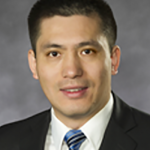
Renfeng Li, PhD: Dr. Li is an Associate Professor of Microbiology and Molecular Genetics and a member of the Cancer Virology research program at UPMC Hillman. Epstein-Barr virus (EBV) is a causative agent of nasopharyngeal cancer (a type of head and neck cancer), stomach cancer and several types of lymphomas. Supported by an NIH ROI and American Cancer Society Research Scholar grants, Dr. Li’s research centers on understanding the molecular mechanisms by which viral and host factors control the transition of EBV from latency to reactivation with a goal of developing novel therapeutic strategies to cure EBV-associated cancer.
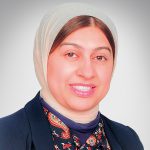 Anwaar Saeed, MD: Dr. Saeed is an Associate Professor of Medicine and the Chief of the Gastrointestinal (GI) Medical Oncology Program at UPMC as well as a member of the Cancer Therapeutics research program. She also serves as the Vice Chair of the Colorectal Cancer Committee of the NSABP Foundation. Her research efforts are focused on immune modulatory approaches in patients with gastric & esophageal cancer, colon cancer and hepatocellular carcinoma as well as chemoprevention/ immunoprevention in the high-risk GI population. Dr. Saeed has led over 40 clinical trials and is currently the PI on several investigator-initiated trials focused on novel targeted immunotherapy combinations. She is also the study chair for a soon to open SWOG/intergroup NCI national trial (S2303) testing a novel chemo-immunotherapy regimen in patients with advanced gastric & esophageal adenocarcinoma.
Anwaar Saeed, MD: Dr. Saeed is an Associate Professor of Medicine and the Chief of the Gastrointestinal (GI) Medical Oncology Program at UPMC as well as a member of the Cancer Therapeutics research program. She also serves as the Vice Chair of the Colorectal Cancer Committee of the NSABP Foundation. Her research efforts are focused on immune modulatory approaches in patients with gastric & esophageal cancer, colon cancer and hepatocellular carcinoma as well as chemoprevention/ immunoprevention in the high-risk GI population. Dr. Saeed has led over 40 clinical trials and is currently the PI on several investigator-initiated trials focused on novel targeted immunotherapy combinations. She is also the study chair for a soon to open SWOG/intergroup NCI national trial (S2303) testing a novel chemo-immunotherapy regimen in patients with advanced gastric & esophageal adenocarcinoma.
 Kathryn Schmitz, PhD, MPH: Dr. Schmitz is a Professor in the University of Pittsburgh Department of Medicine, Division of Hematology/Oncology and the Associate Director for Catchment Area Research for HCC. As the foremost expert in exercise oncology, including the use of exercise in cancer prevention, control, and survivorship, Dr. Schmitz has led many exercise trials, translated her work into clinical practice, published approximately 300 peer-reviewed scientific papers, and received $30 million in funding for her research since 2001. She is currently building the exercise oncology program at HCC. She is also leading catchment area and exercise oncology research studies to quantify barriers to cancer relevant health behavior and develop interventions, particularly exercise, to overcome these barriers for under-represented minority and rural members of the HCC catchment area. Dr. Schmitz will collaborate with basic, clinical, and population research faculty across the cancer center to help maximize the impact of these efforts.
Kathryn Schmitz, PhD, MPH: Dr. Schmitz is a Professor in the University of Pittsburgh Department of Medicine, Division of Hematology/Oncology and the Associate Director for Catchment Area Research for HCC. As the foremost expert in exercise oncology, including the use of exercise in cancer prevention, control, and survivorship, Dr. Schmitz has led many exercise trials, translated her work into clinical practice, published approximately 300 peer-reviewed scientific papers, and received $30 million in funding for her research since 2001. She is currently building the exercise oncology program at HCC. She is also leading catchment area and exercise oncology research studies to quantify barriers to cancer relevant health behavior and develop interventions, particularly exercise, to overcome these barriers for under-represented minority and rural members of the HCC catchment area. Dr. Schmitz will collaborate with basic, clinical, and population research faculty across the cancer center to help maximize the impact of these efforts.
Hillman Early-Career Fellows for Innovative Cancer Research
 Serah Choi, MD, PhD: Dr. Choi is an Assistant Professor in Radiation Oncology and a member of the Genome Stability research program. As a physician, her main clinical interest is to improve outcomes for patients with brain tumors. As a researcher, Dr. Choi is interested in the sodium-dependent glucose cotransporter SGLT2 expressed in glioblastomas. Her goals include developing a better understanding of the functional interaction between SGL2 and its accessory protein MAP17 as well as optimizing imaging and targeting of SGLT2 in glioblastoma.
Serah Choi, MD, PhD: Dr. Choi is an Assistant Professor in Radiation Oncology and a member of the Genome Stability research program. As a physician, her main clinical interest is to improve outcomes for patients with brain tumors. As a researcher, Dr. Choi is interested in the sodium-dependent glucose cotransporter SGLT2 expressed in glioblastomas. Her goals include developing a better understanding of the functional interaction between SGL2 and its accessory protein MAP17 as well as optimizing imaging and targeting of SGLT2 in glioblastoma.
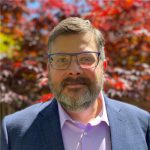 Eric Lechman, PhD: Dr. Lechman recently joined the University of Pittsburgh and HCC as an Assistant Professor of Medicine and member of the Cancer Therapeutics research program. His areas of expertise center on human hematopoietic and leukemia stem cell biology. Specifically, he seeks to understand miRNA control of the molecular and signaling pathways that direct the cellular fate of normal and malignant human hematopoietic stem and progenitor cells, and to elucidate the developmental, cellular and molecular origins of adult and pediatric leukemia.
Eric Lechman, PhD: Dr. Lechman recently joined the University of Pittsburgh and HCC as an Assistant Professor of Medicine and member of the Cancer Therapeutics research program. His areas of expertise center on human hematopoietic and leukemia stem cell biology. Specifically, he seeks to understand miRNA control of the molecular and signaling pathways that direct the cellular fate of normal and malignant human hematopoietic stem and progenitor cells, and to elucidate the developmental, cellular and molecular origins of adult and pediatric leukemia.
 Angela Mazul, PhD, MPH: Dr. Mazul is a newly appointed Assistant Professor in the Department of Otolaryngology at the University of Pittsburgh and a member of HCC’s Cancer Epidemiology and Prevention research program. Dr. Mazul focuses on head and neck cancer epidemiology, specifically understanding and addressing health disparities in cancer presentation and outcomes and has a K award from the National Institutes of Health for her work on social and molecular determinants of human papillomavirus-associated cancers. She is developing a case-control study with prospective follow-up of patients in Western Pennsylvania to elucidate this pathway in head and neck cancer.
Angela Mazul, PhD, MPH: Dr. Mazul is a newly appointed Assistant Professor in the Department of Otolaryngology at the University of Pittsburgh and a member of HCC’s Cancer Epidemiology and Prevention research program. Dr. Mazul focuses on head and neck cancer epidemiology, specifically understanding and addressing health disparities in cancer presentation and outcomes and has a K award from the National Institutes of Health for her work on social and molecular determinants of human papillomavirus-associated cancers. She is developing a case-control study with prospective follow-up of patients in Western Pennsylvania to elucidate this pathway in head and neck cancer.

Yvonne Mowery, MD, PhD, DABR: A new Associate Professor of Radiation Oncology and member of the Genome Stability research program, Dr. Mowery is a clinician-scientist actively involved in preclinical and clinical research related to head and neck cancer. Active in basic and translational research and supported by NIH funds, her main area of focus is the combination of radiation therapy with immunotherapy. She is the principal investigator for an investigator-initiated multi-institutional trial evaluating pembrolizumab with a radiosensitizing drug and radiation therapy to treat recurrent head and neck cancer.
 Benjamin Nacev, MD, PhD: Dr. Nacev, an Assistant Professor of Medicine and member of the Genome Stability program, is a physician scientist who treats adults with sarcoma. His research program, supported by a K08 award from the NCI, focuses on understanding how cancer-associated genetic alterations in chromatin regulators promote cancer and how to leverage this understanding to advance new therapeutic approaches in the clinic. In particular, he is interested in how the epigenome is dysregulated to alter transcriptional and developmental programs important for cancer growth and oncogenic behavior.
Benjamin Nacev, MD, PhD: Dr. Nacev, an Assistant Professor of Medicine and member of the Genome Stability program, is a physician scientist who treats adults with sarcoma. His research program, supported by a K08 award from the NCI, focuses on understanding how cancer-associated genetic alterations in chromatin regulators promote cancer and how to leverage this understanding to advance new therapeutic approaches in the clinic. In particular, he is interested in how the epigenome is dysregulated to alter transcriptional and developmental programs important for cancer growth and oncogenic behavior.

Wayne Stallaert, PhD: Dr. Stallaert joined the University of Pittsburgh faculty as an Assistant Professor in Computational and Systems Biology and HCC as a member of the Cancer Biology research program. His lab combines advanced single-cell imaging and computational approaches in patient-derived tissues and organoids to study the contribution of cell cycle plasticity in tumorigenesis and cancer drug resistance, and how the spatial organization of a tumor shapes a cancer cell’s decision to proliferate or arrest.
Hillman Clinician-Scientist Fellows for Innovative Cancer Research
Bashir Lawal, PhD: Functional and Mechanistic Characterization of EPHA3 intragenic rearrangements in high-grade serous carcinoma progression and recurrence
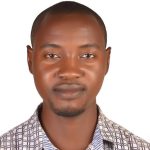
High-grade serous ovarian cancer (HGSC) accounts for up to 80% of ovarian cancer mortality, and overall survival has not been improved for decades due to the lack of actionable genetic drivers. Our genome-wide analysis of copy number data revealed a potential intragenic duplication of the receptor tyrosine kinase EPHA3, which will be investigated in this project to assess its role in HGSC progression, recurrence, and potential as a novel therapeutic target. Successful accomplishment of this project could pave the way to a new precision medicine targeting EPHA3 intragenic rearrangement, which would benefit a substantial population of patients suffering from this deadly disease. Dr. Lawal is a postdoctoral fellow in the laboratory of Dr. Xiaosong Wang. He was selected as a Hillman Postdoctoral Fellow for Innovative Cancer Research in 2022.
Kathryn Demanelis, PhD and Peng Gao, PhD: Impact of environmental carcinogens detected in the blood chemical exposome on genome-wide DNA methylation and lung cancer risk in western Pennsylvania

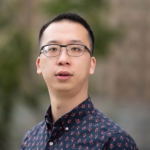
Lung cancer (LC) is a serious disease, and the five-year survival is less than 20%. Western Pennsylvania has a higher rate of LC than the US, and ~40% of western Pennsylvanian adults are current or former smokers. Smoking is the primary cause of LC, but only 10-16% of lifelong smokers will develop LC. In addition to smoking, environmental carcinogens (ECs) may increase LC risk. This pilot study will simultaneously measure blood ECs, evaluate their impact on the biological factors that may promote L C, and determine the impact of socioeconomic and environmental factors on the individual’s levels of exposure to ECs.
Baoli Hu, PhD: Deciphering cancer cell plasticity contributing to glioblastoma immunosuppression
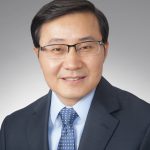 Glioblastoma is the most common and nearly untreatable brain cancer. This proposed research is focused on understanding how tumor cells are capable of becoming the other cell type, called macrophage-like cells, which can accelerate tumor growth and make tumors resistant to treatment. It is generally believed that tumor cells can recruit macrophages to favor their growth. Here, we propose and test a new concept that a subset of tumor cells can become macrophage-like cells to promote tumor rapid growth. This study may deepen our understanding of cancer cell multipotency and fundamentally change our current treatment strategies for glioblastoma therapy.
Glioblastoma is the most common and nearly untreatable brain cancer. This proposed research is focused on understanding how tumor cells are capable of becoming the other cell type, called macrophage-like cells, which can accelerate tumor growth and make tumors resistant to treatment. It is generally believed that tumor cells can recruit macrophages to favor their growth. Here, we propose and test a new concept that a subset of tumor cells can become macrophage-like cells to promote tumor rapid growth. This study may deepen our understanding of cancer cell multipotency and fundamentally change our current treatment strategies for glioblastoma therapy.
Yael Nechemia-Arbely, PhD: CENP-A overexpression drives tumorigenesis through genome and chromosomal instability
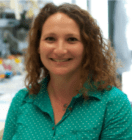
This study aims to reveal whether expression at high levels of a specific protein called CENP-A can induce changes in human genomes, such as the loss or gain of a chromosome, parts of chromosomes or the breakdown of a chromosome into hundreds of pieces, all of which can fuel cancer progression. At normal levels, CENP-A protein is essential for accurate cell division and for maintaining genome integrity. High levels of CENP-A appear in certain types of cancers, including pancreatic and lung cancers, and predict poor prognosis. Further exploration of CENP-A regulation and effects on genome integrity may reveal novel pathways that affect cancer progression and acquisition of genome instability. It may also provide insight for designing potentially new therapies that aim to reduce CENP-A.
Sarah Taylor, MD and Lan Coffman, MD, PhD: Environmental pollutants contributing to the pathogenesis of small cell carcinoma of the ovary, hypercalcemic type in western Pennsylvania


Small cell ovarian cancer hypercalcemic type (SCCOHT) is a rare and aggressive subtype of ovarian cancer. The cause is unknown, but there is evidence for both familial and environmental factors. Despite its rare occurrence, there have been several regional cases, prompting us to investigate if there is an environmental exposure contributing to the elevated burden of SCCOHT in western PA. We will analyze one gene (SMARCA4) that has been found in over 95% of cases to determine if the mutation was inherited or arouse spontaneously. The patient’s last address will be used to look at local environmental pollutants.
Meghan Tipre, DrPH, MSPH and Jan Beumer, PharmD, PhD, DABT: Minority and Underserved Accrual to UPMC Hillman Clinical Trials Principal

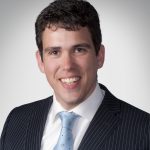
Clinical trials (CTs) play a critical role in efforts to reduce cancer burden by evaluating the safety and effectiveness of new potential methods for the prevention, detection, and treatment of cancer. However, representation of racial/ethnic minorities in CTs remain historically low despite being most impacted by cancer. In this study, we aim to (1) understand the socio-demographic make-up of Hillman Cancer Center’s CT accruals in the last 12 years; and (2) engage with stakeholders including HCC leadership, providers and cancer patients to identify barriers to CT conversion and practical strategies at structural, clinical, physician, and patient-levels to address them.


